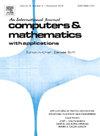Computationally efficient r−adaptive graded meshes over non-convex domains
IF 2.9
2区 数学
Q1 MATHEMATICS, APPLIED
引用次数: 0
Abstract
This study explores the use of r-adaptive mesh refinement strategies for elliptic partial differential equations (PDEs) posed on non-convex domains. We introduce an r-adaptive strategy based on a simplified optimal transport method to create a graded mesh, distributing the interpolation error evenly, considering the solution's local asymptotic behaviour. The grading ensures good mesh compression and regularity, regardless of dimension or location. We showcase our approach by studying discontinuous Galerkin (dG) finite element approximations. We utilise a posteriori error estimates for the dG method on general meshes, showing equidistribution across our graded mesh. Numerical tests on ‘L-shaped’ and ‘crack’ domains confirm that our method achieves optimal convergence rates.
非凸域上计算效率高的r -自适应梯度网格
本研究探讨了非凸域上椭圆偏微分方程(PDEs)的r-自适应网格细化策略的使用。我们引入了一种基于简化的最优传输方法的r-自适应策略来创建渐变网格,均匀分布插值误差,考虑到解的局部渐近行为。分级确保良好的网格压缩和规则,无论尺寸或位置。我们通过研究不连续伽辽金(dG)有限元近似来展示我们的方法。我们在一般网格上使用dG方法的后验误差估计,在我们的分级网格上显示均匀分布。在“l形”和“裂纹”域上的数值试验证实了我们的方法达到了最佳的收敛速度。
本文章由计算机程序翻译,如有差异,请以英文原文为准。
求助全文
约1分钟内获得全文
求助全文
来源期刊

Computers & Mathematics with Applications
工程技术-计算机:跨学科应用
CiteScore
5.10
自引率
10.30%
发文量
396
审稿时长
9.9 weeks
期刊介绍:
Computers & Mathematics with Applications provides a medium of exchange for those engaged in fields contributing to building successful simulations for science and engineering using Partial Differential Equations (PDEs).
 求助内容:
求助内容: 应助结果提醒方式:
应助结果提醒方式:


